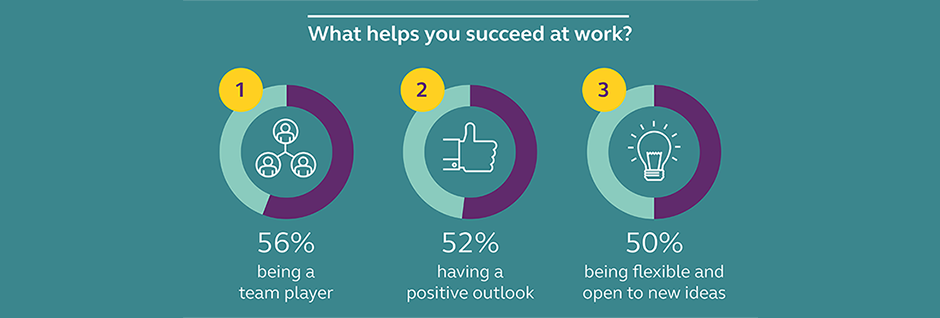23/10/2017 | The most common office personalities, and how to work better together
We spend more time per year with our colleagues than almost anyone else. Our new survey reveals all about who we work with – and how to work better with them.
Half of UK employees (50%) admit they can find it hard to navigate the workplace. And with so many personalities to be found in the office, 74% of workers agree that knowing how to effectively manage personalities would help them succeed at work. So we’ve teamed up with leading business psychologist, Dr Lynda Shaw, to give employees a helping hand and provide advice on how best to navigate the workplace.
The most common office personalities
We asked 2,055 UK workers to tell us which of these common workplace characters they're most likely to encounter at work:
The Grafter
This person is heads down and gets the results; a safe pair of hands.
The Chatterbox
Always chatting; in the office, in the kitchen, and they know everything there is to know.
The Workaholic
First in and last to leave, and work is their life; do they sleep in the office?!
The Comedian
Always making everybody laugh and is the centre of attention at work events.
The Wallflower
The shy and retiring type that keeps their head down at work.
The Micromanager
The one who needs to be across every detail and every team member.
The Big Talker
You always know when this person's had a recent success because you'll hear about it!
The Delegator
The one who passes work on to someone else as soon as it comes their way.
The Charmer
Mmooth talking and easy going; unflappable and can talk their way out of any situation.
The Juggler
Juggling multiple tasks with ease, they make it seem easy!
39% of Brits said they’re most likely to find a results-getting ‘Grafter’ in their workplace. Not far behind, you might encounter the next-level Grafter, the ‘Workaholic’ (27%) – first in, last out, they might actually sleep at their desk. Not to be outdone, 35% of professionals say the ‘Chatterbox’ – source of everything you need to know, including office gossip - is the character they’re most likely to find in their workplace!
But what about those co-workers who are a bit, well, interesting to deal with? Professionals said they find the office show-off, or ‘Big Talker’, the most tricky character to work with. Elsewhere, 22% feel they need the most support to work with their office’s ‘Micromanager’, the one who needs to be all over every detail, no matter how small.
The top office personalities that people would like to learn to better interact with:
Of course it’s not just about knowing who you’re working with, but also how to work with them. 74% of workers agree that knowing how to effectively manage personalities would help them succeed at work.
Dr Lynda Shaw states: “It’s important to remember that every person is unique. We all have individual personalities and motivations which cause us to react differently in situations, be that at work or in our personal lives. Thinking specifically about the workplace, it’s vital that we recognise and value these personal differences, because being able to anticipate how someone might react, and knowing how to handle individual personalities, can help us be successful at work. There is no set of rules on how to navigate the workplace but there are some tips and tricks we can all benefit from.”
It's obvious that good working relationship with our colleagues plays a fundamental role in our professional success. But it’s not the only quality playing a key part, with UK professionals saying that it’s also important to be a team player (56%), have a positive outlook (52%) and be flexible within the job role (50%).

Edward Fotheringham, our Head of Sales and Reservations, comments:
“At Premier Inn, we are committed to making things easy for the thousands of business guests we welcome through our doors and this extends beyond their stay with us. It’s no secret that the workplace can feel like a minefield to navigate sometimes and this research confirms that understanding the inner workings of our colleagues’ minds is hugely important. By offering advice and support in this field, we hope employees around the UK will be armed with the right tools to spend more time doing their job brilliantly.”
Here’s Dr Lynda Shaw’s top tips for navigating the workplace:
• Be calm and stay in control; this will help people learn to respect you as a voice of reason, no matter who they are.
• Get to know people; What are their hobbies; do they have a family, if so, what are their names; building rapport will help you handle all types of personalities.
• Explain your intentions clearly; People are not mind readers, so don’t assume you are understood, instead make sure you are calm and assertive.
• Equally, make the effort to understand other people’s intentions. Ask them their thought processes in doing things, you may learn something and you will definitely be showing them respect.
• Establish the terrain when you start a new job – find out who the different personalities are so you can adapt your working style to work best with them. If you know there are personalities you might clash with – think about how to adapt your style to make working with them easier.
• Prepare for the different personalities that you may encounter in a board meeting – if you’re leading the meeting, it may help to do some prep in advance, for example, by having a very focused agenda.